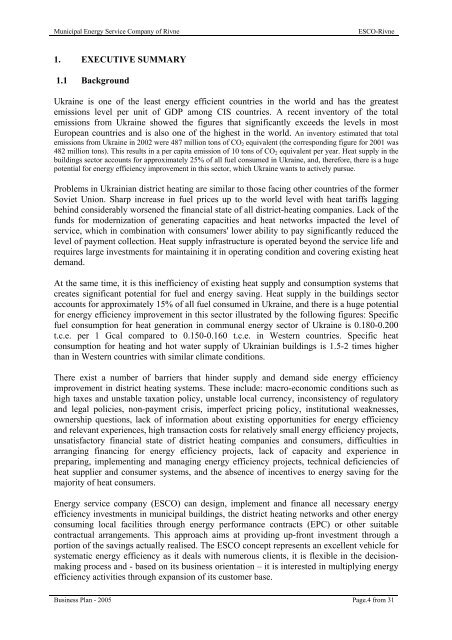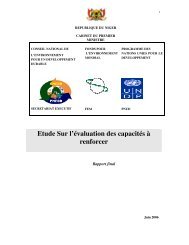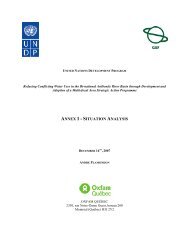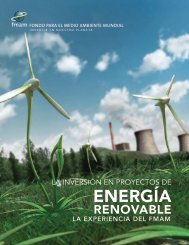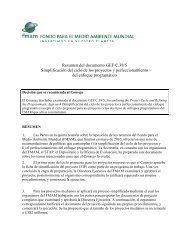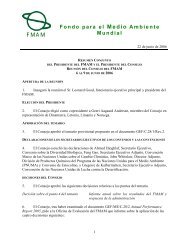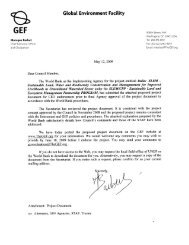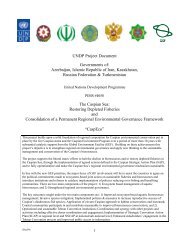Business Plan ESCO - Rivne - Global Environment Facility
Business Plan ESCO - Rivne - Global Environment Facility
Business Plan ESCO - Rivne - Global Environment Facility
You also want an ePaper? Increase the reach of your titles
YUMPU automatically turns print PDFs into web optimized ePapers that Google loves.
Municipal Energy Service Company of <strong>Rivne</strong> <strong>ESCO</strong>-<strong>Rivne</strong><br />
1. EXECUTIVE SUMMARY<br />
1.1 Background<br />
Ukraine is one of the least energy efficient countries in the world and has the greatest<br />
emissions level per unit of GDP among CIS countries. A recent inventory of the total<br />
emissions from Ukraine showed the figures that significantly exceeds the levels in most<br />
European countries and is also one of the highest in the world. An inventory estimated that total<br />
emissions from Ukraine in 2002 were 487 million tons of CO2 equivalent (the corresponding figure for 2001 was<br />
482 million tons). This results in a per capita emission of 10 tons of CO2 equivalent per year. Heat supply in the<br />
buildings sector accounts for approximately 25% of all fuel consumed in Ukraine, and, therefore, there is a huge<br />
potential for energy efficiency improvement in this sector, which Ukraine wants to actively pursue.<br />
Problems in Ukrainian district heating are similar to those facing other countries of the former<br />
Soviet Union. Sharp increase in fuel prices up to the world level with heat tariffs lagging<br />
behind considerably worsened the financial state of all district-heating companies. Lack of the<br />
funds for modernization of generating capacities and heat networks impacted the level of<br />
service, which in combination with consumers' lower ability to pay significantly reduced the<br />
level of payment collection. Heat supply infrastructure is operated beyond the service life and<br />
requires large investments for maintaining it in operating condition and covering existing heat<br />
demand.<br />
At the same time, it is this inefficiency of existing heat supply and consumption systems that<br />
creates significant potential for fuel and energy saving. Heat supply in the buildings sector<br />
accounts for approximately 15% of all fuel consumed in Ukraine, and there is a huge potential<br />
for energy efficiency improvement in this sector illustrated by the following figures: Specific<br />
fuel consumption for heat generation in communal energy sector of Ukraine is 0.180-0.200<br />
t.c.e. per 1 Gcal compared to 0.150-0.160 t.c.e. in Western countries. Specific heat<br />
consumption for heating and hot water supply of Ukrainian buildings is 1.5-2 times higher<br />
than in Western countries with similar climate conditions.<br />
There exist a number of barriers that hinder supply and demand side energy efficiency<br />
improvement in district heating systems. These include: macro-economic conditions such as<br />
high taxes and unstable taxation policy, unstable local currency, inconsistency of regulatory<br />
and legal policies, non-payment crisis, imperfect pricing policy, institutional weaknesses,<br />
ownership questions, lack of information about existing opportunities for energy efficiency<br />
and relevant experiences, high transaction costs for relatively small energy efficiency projects,<br />
unsatisfactory financial state of district heating companies and consumers, difficulties in<br />
arranging financing for energy efficiency projects, lack of capacity and experience in<br />
preparing, implementing and managing energy efficiency projects, technical deficiencies of<br />
heat supplier and consumer systems, and the absence of incentives to energy saving for the<br />
majority of heat consumers.<br />
Energy service company (<strong>ESCO</strong>) can design, implement and finance all necessary energy<br />
efficiency investments in municipal buildings, the district heating networks and other energy<br />
consuming local facilities through energy performance contracts (EPC) or other suitable<br />
contractual arrangements. This approach aims at providing up-front investment through a<br />
portion of the savings actually realised. The <strong>ESCO</strong> concept represents an excellent vehicle for<br />
systematic energy efficiency as it deals with numerous clients, it is flexible in the decisionmaking<br />
process and - based on its business orientation – it is interested in multiplying energy<br />
efficiency activities through expansion of its customer base.<br />
<strong>Business</strong> <strong>Plan</strong> - 2005 Page.4 from 31


